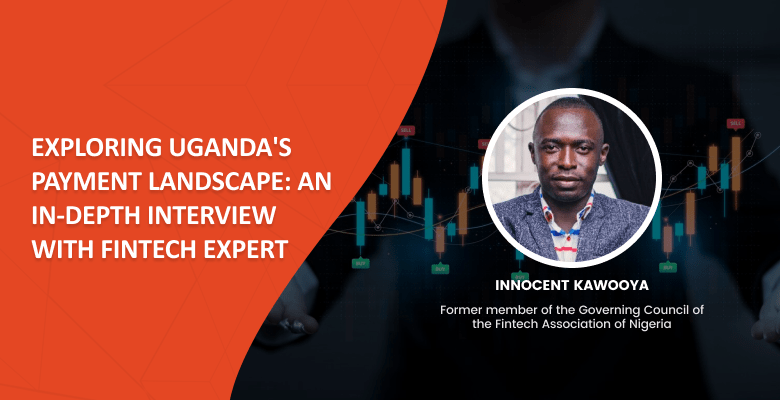
In a world where financial technology is rapidly transforming, understanding different market dynamics is crucial. Akurateco had the privilege of interviewing Innocent Kawooya, a leading expert in the Ugandan payments sector. In this comprehensive interview, Kawooya shares his insights into the evolving landscape of payments in Uganda, discussing trends, challenges, and opportunities.
About Innocent Kawooya
Innocent Kawooya is a distinguished Ugandan computer programmer, FinTech specialist, Internet entrepreneur, film producer, and philanthropist. As the co-founder and CEO of HiPipo, a digital innovation and financial inclusion organization, he has significantly influenced the FinTech and financial inclusion landscape in Africa. Under his leadership, HiPipo has played a pivotal role in promoting secure digital financial services and extending access to innovative financial solutions to the underprivileged.
Awarded the CEO of the Year 2021-2022 by TIG Network Afrika, Kawooya’s contributions extend beyond his organization. He marked his foray into politics in the 2021 general elections, standing as an independent candidate for the Lord Mayor of Kampala City. His career began with the establishment of HiPipo in a Makerere University computer lab in 2005, transforming it into a multi-diversified company impacting various sectors, including digital innovation, finance, and creative arts. Kawooya has been instrumental in launching influential brands and projects, such as the HiPipo Music Awards and the Include Everyone program, which encompasses various financial inclusion projects like hackathons, expos, and the Digital Impact Awards Africa. His educational background includes studies at Sikkim Manipal University, SMACON, and SHACK. A visible advocate for digital innovation and financial inclusion, Innocent Kawooya’s expertise and leadership continue to drive positive change in the African digital financial services sector.
Market Overview
Can you name the top 2-3 payment processing companies in Uganda that are setting the trend in the market?
In Uganda, the trend-setting payment processing companies include Craft Silicon, Pegasus, DusuPay, Yo Uganda, MTN, and Future Link Technologies. These organizations are driving the evolution of payment processing in our region.
What are the most popular acquiring banks for businesses in Uganda?
The most popular acquiring banks for businesses here are CNBA, Equity, Citi Bank, KCB Bank, Stanbic Bank, and Standard Chartered Bank. These banks play a crucial role in facilitating business transactions and supporting the growing needs of businesses.
What challenges do businesses typically face when it comes to choosing the correct payment provider in Uganda?
Primarily, there’s a significant knowledge gap as most businesses don’t possess the financial literacy or the necessary information to make informed decisions about digital financial solutions. This makes it difficult to evaluate and select the most suitable payment provider for their needs.
Moreover, the market is dominated by a few key players, creating a sense of monopoly. This lack of competition limits the options available for businesses, especially in terms of business banking applications. It’s not just about the scarcity of options, but also about how these options are presented to the businesses. There’s a clear gap in deliberate training and capacity building for potential customers by the service providers. Most players in this space focus more on marketing their commercial products rather than educating their customers on the best financial solutions for their businesses.
The challenges don’t end there. The process of setting up formal business banking accounts, which is essential for business transactions, is notably cumbersome. It takes an average of three weeks to get a formal bank account for a company, which can be a significant barrier to entry for many businesses. This lengthy process, combined with the high sense of monopoly and limited knowledge among business owners, creates a challenging environment for choosing the right payment provider in Uganda.
Are there any limiting factors for Fintech companies government-wise? Is it harder to launch a Fintech/payment business in Uganda compared to other countries in the region?
Launching a Fintech or payment business in Uganda is indeed more challenging due to several governmental limitations. A key obstacle is the stringent National Payment Systems Act, which imposes high licensing fees, making it particularly tough for startups. These fees, amounting to over $40,000, can be prohibitive for new and small-scale innovators.
Additionally, technology constraints, like the widespread use of USSD technology and feature phones, limit the scope of advanced Fintech solutions. The costs for utilizing platforms from the Uganda Communications Commission are also significant, starting from $10,000 annually and increasing with transaction volumes. This financial burden further complicates the establishment and growth of Fintech businesses in Uganda, especially when compared to other countries in the region where the Fintech environment might be more developed and supportive.
What do you think makes the Ugandan payment landscape unique compared to other countries?
The Ugandan payment landscape is distinctive mainly due to its significant base of big investors and a thriving innovation scene. Unlike other markets where big investments dominate, Uganda’s ecosystem is rich with numerous passionate solution creators and a multitude of small but impactful innovations. This unique blend of investment and innovation has been crucial in driving the Fintech sector forward.
Recent Trends
How has the rise of mobile payments affected traditional banking methods in Uganda?
The advent of mobile payments in Uganda has had both positive and negative impacts on traditional banking. On the positive side, it has greatly expanded access to banking services. For instance, the number of registered accounts has seen a substantial increase due to mobile money services. Innovations like mobile money lending products have also emerged, reshaping the banking landscape. On the downside, these changes have put traditional banks under pressure to innovate and adapt to the growing preference for mobile solutions.
Are cryptocurrencies or blockchain technologies gaining traction in the payment space in Uganda?
Cryptocurrencies and blockchain technologies are starting to gain some traction in Uganda, but there’s still a long way to go. They are not yet widely understood by the general population, including myself, which indicates a need for more education and awareness about these technologies. The potential is there, but it’s in the early stages of adoption.
How has the COVID-19 pandemic influenced payment behaviors and technologies?
Surely, the pandemic has significantly accelerated the shift towards digital-first approaches in payment behaviors and technologies in Uganda. With movement restrictions and the risk of virus transmission, there’s been a noticeable increase in digital transactions. Businesses and consumers alike are increasingly opting for digital payment methods for efficiency and safety.
Can you speak about any new payment regulations or policies that have had a significant impact on the industry?
The National Payment System Act of 2020 is a key regulation that has shaped the payments industry in Uganda. It has provided clear guidelines and authority for the operation of payment systems, enhancing the safety and efficiency of payment services. However, while it has had positive impacts in terms of structuring the industry, some aspects of the Act pose challenges, especially for smaller players and innovators.
Community and Networking
Are there any annual events, conferences, or meetups where the payment community in Uganda usually gathers?
In Uganda, several key events bring together the payment community. These include:
- 40 Days 40 FinTechs
- Women In FinTech Hackathon and Women In FinTech Summit
- Digital and Financial Inclusion Summit
- Annual FinTech Conference
- Financial Sector Deepening Uganda
These gatherings are crucial for networking, sharing insights, and staying abreast of the latest trends in the Fintech and payment sectors.
How do you usually keep yourself updated with the latest trends and technologies in the payment sector?
I engage with several platforms and communities to stay abreast of the latest developments in the payment sector. My primary sources include the Financial Services For Poor initiative by the Gates Foundation and the Level One Project. Additionally, I’m an active member of the Mojaloop community. These platforms provide valuable insights into global trends and innovations. Besides, I regularly use LinkedIn and Twitter to follow industry news and connect with fellow professionals. These tools help me stay informed about the evolving dynamics of the payment sector.
Can you recommend any local influencers or thought leaders in the payment industry that people should follow?
Definitely! I would recommend following John Mark Ssebunnya, Damali Ssali, and Flavia Eleanor. They are prominent figures in the Ugandan payment industry and offer strategic insights into the Fintech landscape. Their expertise is invaluable for anyone looking to understand the challenges and opportunities within the Ugandan market.
Future Outlook
What technologies or trends do you see shaping the future of payments in Uganda?
The future of payments in Uganda is likely to be shaped by several key factors. Foremost among these is the influence of projects like the Level One Project (here is one of their most significant projects) and Mojaloop, which advocate for interoperability and real-time payments. These initiatives are driving a shift towards more cost-effective and sustainable payment solutions. Another significant trend is the increasing adoption of low-cost smart technology, enabling broader access to financial services. These technologies and trends are poised to redefine the payment landscape in Uganda, enhancing financial inclusion and operational efficiency.
Where do you see opportunities for international companies in the Ugandan payment ecosystem?
There are several promising opportunities for international companies in Uganda’s payment ecosystem. Areas such as low-cost remittances, cross-border payments, forex, and low-interest loans for merchants and startups are ripe for exploration. International companies can bring in innovation and efficiency, by addressing these areas to tap into a growing market. Investments in these sectors can significantly impact the Ugandan economy and its financial services sector.
What advice would you give to businesses looking to break into the Ugandan payment market?
Businesses aiming to enter the Ugandan payment market should focus on understanding and catering to specific niches. It’s crucial to develop products that meet the unique needs of different market segments. Recognizing and addressing these specific requirements can lead to more effective and successful market penetration.
Additionally, businesses should be prepared to navigate the unique challenges and opportunities that the Ugandan market presents
Personal Insights
In your experience, what has been the most surprising change or development in the Ugandan payment community?
One of the most surprising developments has been the widespread adoption of mobile payments. As of July 2022, at least 86% of Ugandan households that own phones use mobile payment services, such as Mobile Money, according to a report “Mobile Money, Financial Inclusion, and Unmet Opportunities. Evidence from Uganda”. This rapid adoption reflects a significant shift in payment behaviors and signifies a substantial move towards digital financial solutions in Uganda.
Do you have any case studies or examples of innovative payment solutions that have been successfully implemented in Uganda?
Sure, several innovative payment solutions have made a significant impact in Uganda. For instance, KAWU, a student wallet application developed by university students, facilitates savings and transactions for high school students. Other examples include MoMo, Airtel Money, SafeBoda, and the Little App. These solutions have not only transformed the way payments are made but also increased financial inclusion across different user demographics.
Final Word
Innocent Kawooya’s insights offer a unique window into Uganda’s dynamic payment landscape, highlighting the challenges, opportunities, and innovations shaping this vibrant sector. His perspective underscores the importance of understanding local market nuances and the transformative role of technology in financial inclusion. As the payment industry continues to evolve globally, learning from diverse regional experiences becomes increasingly crucial.
For further exploration into the African payment ecosystem, we invite you to read our expert interviews focusing on other key markets in the continent. Discover the intricacies of the Nigerian payment landscape and delve into the Kenyan payment ecosystem. Additionally, for a comprehensive understanding of payment methods in Uganda, don’t miss Akurateco’s detailed guide, available here. These resources provide valuable context and knowledge, contributing to a broader understanding of the African financial technology landscape.






